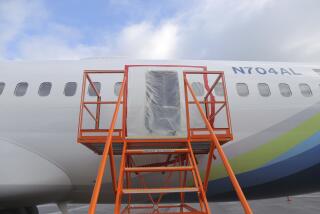Independence, Objectivity Are Hallmarks of Inquiry Leader
- Share via
WASHINGTON — Whether scrutinizing a fellow admiral charged with sexual misconduct or probing weaknesses in Navy operations that made a destroyer vulnerable to terrorists, retired four-star Adm. Harold Gehman has gained a reputation for unflinching independence.
That quality is likely to be put to the test when Gehman, 60, takes the helm of a NASA- appointed commission charged with investigating what went wrong with the space shuttle Columbia, said some of Gehman’s former bosses and colleagues.
Members of the commission had no sooner been named than questions were raised about their ability to remain autonomous. All are former or current government officials.
Some investigative commissions comprising senior government officials -- such as the one that investigated the 1986 Challenger disaster under the leadership of former Secretary of State William P. Rogers -- have been criticized for lack of zeal in uncovering problems. It was one of the Rogers commission’s outside members, late Nobel physicist Richard Feynman of Caltech, who played a lead role in spotlighting the problem that led to the Challenger disaster.
NASA Administrator Sean O’Keefe, a former secretary of the Navy, told “Fox News Sunday” that Gehman “is going to guarantee that we leave absolutely no theory unturned.”
The commission, named the Space Shuttle Mishap Interagency Investigation Board, is scheduled to meet for the first time this morning at Barksdale Air Force Base in Louisiana.
David C. Acheson, a New York attorney and businessman who served on the Rogers commission, said the panel should include outside specialists, as theirs did.
“With civilians from outside the government, you have people who are not constrained by any influence,” Acheson said.
Those who have watched Gehman’s career closely said he would ensure that the investigation remained objective.
“Hal Gehman is truly independent. He will be influenced by the facts and only by the facts,” said retired Adm. Kendall Pease, who worked with Gehman in Washington and Norfolk.
It was Gehman’s ability to resist the herd spirit that made him an obvious choice to head the Department of Defense panel that examined the terrorist attack on the destroyer Cole, said Robert Tyrer, who was Pentagon chief of staff when Gehman was selected as a co-chairman of the Cole commission.
“You needed a very senior and knowledgeable person ... but somebody who wouldn’t go through the exercise with the frame of reference of: How do we keep the Navy from being hurt,’” Tyrer said.
“He was one of these guys who is unhesitant to speak his mind,” Tyrer said. “You come to know quickly who makes a point of being especially candid. Hal was in this category.”
The Cole commission’s report concluded that dangerous shortcomings in U.S. military security and intelligence gathering left the destroyer vulnerable to the attack that killed 17 U.S. sailors in 2000 while their vessel was refueling in the port of Aden, Yemen.
Gehman was appointed vice chief of naval operations in 1996, then supreme allied commander, Atlantic, in 1997, when the Navy restructured from a one-service fleet to a coordinated multi-service command.
Before he retired, he played a key role in helping the Navy reform and recover from a series of embarrassing events in the mid-1990s.
When he took the vice chief’s job, the Navy had been demoralized by the Tailhook sex scandal and the suicide of Chief of Naval Operations Jeremy M. Boorda after questions about his character. It also had not addressed technology shortfalls that had been apparent during the Persian Gulf War.
“During Gehman’s tenure as vice chief, he participated in doing those actions that put Tailhook, the Boorda suicide and the Navy’s perceived secondary role in the Gulf War behind them,” said Peter Swartz, a retired Navy captain and analyst at CNA Corp., a federally funded think tank for the Navy.
Throughout that time, Gehman made one hard decision after another about retiring obsolete ships and punishing contemporaries for sexual misconduct.
“He made those decisions based on facts, not emotion,” Pease said. “We used to say, keep your emotion in your back pocket when you go into a meeting with Adm. Gehman. He demanded the facts.”
But Acheson, a member of the Rogers commission, suggested that Gehman has his work cut out for him, given the composition of the board. He said that without members from outside government it would be very difficult to have sufficient independence to fully investigate both the specific causes of the Columbia accident and the broader NASA institutional culture that may have played a role in the disaster.
“This is not a wise move,” Acheson said. “A civilian commission freed us from the influence of people trying to cover the government’s behind.”
The other officials and former officials named by NASA to join Gehman on the commission are:
* Rear Adm. Stephen Turcotte, commander, U.S. Naval Safety Center, Norfolk, Va.
* Maj. Gen. John L. Barry, director, plans and programs, headquarters Air Force Materiel Command, Wright-Patterson Air Force Base, Ohio.
* Maj. Gen. Kenneth W. Hess, commander, Air Force chief of safety, Kirtland Air Force Base, N.M.
* James N. Hallock, from the Transportation Department’s aviation safety division.
* Steven B. Wallace, director of accident investigation for the Federal Aviation Administration.
* Brig. Gen. Duane Deal, commander, 21st Space Wing, Peterson Air Force Base, Colo.
* G. Scott Hubbard, director at NASA’s Ames Research Center, Moffett Field, Calif.
* Ex-officio member and former astronaut Bryan D. O’Connor, NASA’s associate administrator from the Office of Safety and Mission Assurance.
More to Read
Sign up for Essential California
The most important California stories and recommendations in your inbox every morning.
You may occasionally receive promotional content from the Los Angeles Times.













